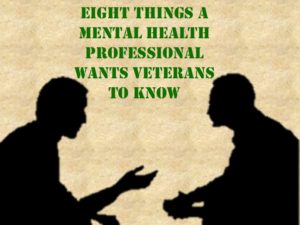
A recent post listed eight things that a veteran wants their mental health counselor to know. It’s extremely important that mental health professionals take the time to understand the cultural aspect of military service, and how the veteran’s time in the military has impacted them. It’s often one of the most critical barriers that veterans face when seeking mental health services: the need to explain themselves and their service to a provider that has little to no understanding about their experiences.
The list was written from my own experience as a combat veteran, and from what I’ve learned from veterans in my own work; this post is looking at things from the other side, based on my experiences as a mental health counselor.
There are some definite misconceptions about the mental health counseling profession that is perpetuated by stigma, both from peers and the community as well as from veterans themselves. We don’t want to be seen as “weak” or “damaged,” although seeking help is not weakness, and if you had a broken foot, you’d go to see a doctor without thinking you’re damaged. Perhaps these thoughts will help overcome some of those misconceptions.
1. This isn’t about Freud on the couch.
One of the most common misconceptions about mental health counseling is that you are going to lie on a couch and talk about your mother. We may, in fact, talk about your mother, but only if that’s something that is causing you concern. Freudian psychoanalysis is only one therapeutic discipline, and it’s unlikely that you will experience it when you reach out.
2. This stuff actually works.
There is actually an extremely good chance that working with a mental health professional will resolve some of the challenges you’re experiencing with anxiety, depression, anger, relational issues, just about anything. There is no need to continue to suffer if someone who knows what they’re talking about can help to relieve that suffering. Most therapeutic modalities provided by competent professionals are effective in resolving these concerns.
3. You’re going to have to talk about what’s bothering you…
Yes, at some point, you will have to talk about whatever is causing you to reach out and seek help. There are some therapeutic styles that don’t require this at all, and there are some that require a lot of it. The thing is, it’s not going to have to happen right away. I often meet with veterans who, on the first day that we meet, they want to tell me about the worst day of their lives. Take it slow, learn some techniques with how to cope with the emotions and reactions that recalling and retelling those events will bring about, and most importantly, learn to trust your counselor. Then, when you’re ready, we can talk about those events.
4. …and it’s not as bad as you think it’s going to be.
How much worse could it be than the nightmares, the intrusive memories, the constant hypervigilance that’s keeping you on edge all the time? “It’s actually helpful to talk about it” is something I’ve heard often. It’s as if these thoughts are trapped in your head, with nowhere to go, so they just keep bouncing around gaining speed and mass until they shred everything inside. By getting it out of our head, talking about it, we can examine the validity of those memories and our attitudes towards them. If we avoid seeking help for the broken foot because the fear of the pain of surgery is too much, then we will have to live with the pain of the unbroken and poorly healed foot.
5. It’s not all about pills and meds.
There are some mental health conditions that absolutely do require medication. There are also some benefits to medication to control mood and emotion, especially when first starting to seek treatment. Consider them as training wheels, though; they are there to help stabilize the bike until you can learn to stabilize the bike on your own. There are differences between psychiatrists, psychologists, and mental health counselors. Psychiatrists prescribe medications, psychologists and counselors do not. Learning how to cope with these experiences without medication can help reduce your reliance upon them.
6. I actually know what I’m talking about.
I didn’t get this degree out of the bottom of a Crackerjack box. Licensed mental health professionals have to have, at a minimum, a Master’s Degree from an accredited program at an actual college or university. In order to obtain, or to be working towards, licensure in the state that I’m operating in, I have to meet some very specific criteria for education, experience, and examination. Just like a Doctor or Lawyer, I wouldn’t be able to do this job if I weren’t qualified. More importantly, I understand the history, theoretical basis, and techniques of my profession. I adhere to a professional code of ethics, and I am a member of professional organizations that help me to maintain my understanding of my profession. If you trust nothing else about me from the beginning, trust that I have the training and experience to help you get to where you want to go.
7. I’m not going to give you advice or tell you what to do.
This isn’t Dr. Phil or Dear Abby. Chances are, you’ve got enough people in your life telling what you should or shouldn’t do, but that’s not what I’m here for. I often tell veterans I work with, “I’m not an answering machine, I’m more of a mirror.” I can ask questions, make statements, help you to understand how your experiences impacted you. I can help you become more aware of why things are the way they are and how they affect you today, but I’m not going to tell you what you should or shouldn’t do. You do that enough to yourself. Together, we can examine how you think and what you believe, and you may be able to come to a greater understanding that you don’t want to think or believe things in a certain way anymore, but I won’t tell you what to do. If that’s what you’re looking for…”just tell me how to stop feeling this way and I’ll do it”…then there’s another misconception we can work on when you come to see me.
8. If you and I don’t click, then let me help you find someone you do click with.
One of the challenges is that, when you were in the military, you only saw your assigned provider. If you and your doc didn’t get along, tough, that’s the only one you got. It doesn’t have to be that way once you get out; not everyone works the same way. I’ve had veterans that started to work with me that didn’t really connect with the whole military-NCO-turned-counselor thing. I’m a big guy and was obviously a Senior NCO when I was in the military; some veterans have real problems with that, as their experiences in the military were around not trusting guys and gals like me. Not a problem…let me find someone who you can connect with. I’m a professional that keeps things professional, and if I take the fact that we don’t have a connection personally, then I’m not keeping things professional. It’s about you, not about me as the counselor; it’s about your needs, not mine.
So there you have it. Eight things that a mental health professional wants a veteran to know. The most important thing, however, is to know that the mental health professional truly wants to, and is able to, help. And that’s the main thing that a counselor wants you to know.




7 Comments
Mike O'Connor · November 1, 2016 at 8:12 am
Great post, Duane!! I hope some veterans get something out of this and I will be glad to share it!
Duane France · November 1, 2016 at 8:42 am
Mike, thanks for the feedback, and thanks even more for spreading the word. Much appreciated!
Jeff Hensley · November 2, 2016 at 7:09 am
Outstanding article! More in our community need to understand what counseling really is – these 8 points can help.
Sharon Gaul · February 5, 2017 at 6:42 pm
Excellent points. All are pertinent and in my experiences represent best practices. Thank you for a superior explanation of the counseling process. I was pleased with your comment which I will paraphrase: “If you and I don’t click, I will help you find someone with whom you will click.” A big reassurance for many.
HST 006: 8 Things a Therapist Wants a Veteran to Know — Head Space and Timing · August 10, 2017 at 4:02 am
[…] Eight Things a Mental Health Professional wants a Veteran to Know (Blog Post) […]
BTU #58 – Duane France: Army NCO to Thought Leader on Veterans Mental Health | Beyond the Uniform · November 4, 2017 at 4:59 pm
[…] 8 Things a Metnal Health Professional Wants a Veteran to Know […]
8 Things a Mental Health Professional Wants a Veteran to Know - Medical Newspaper · January 8, 2018 at 8:58 pm
[…] Duane. “Eight Things a Mental Health Professional Wants a Veteran to Know.” Head Space and Timing, 1 Nov. […]
Comments are closed.